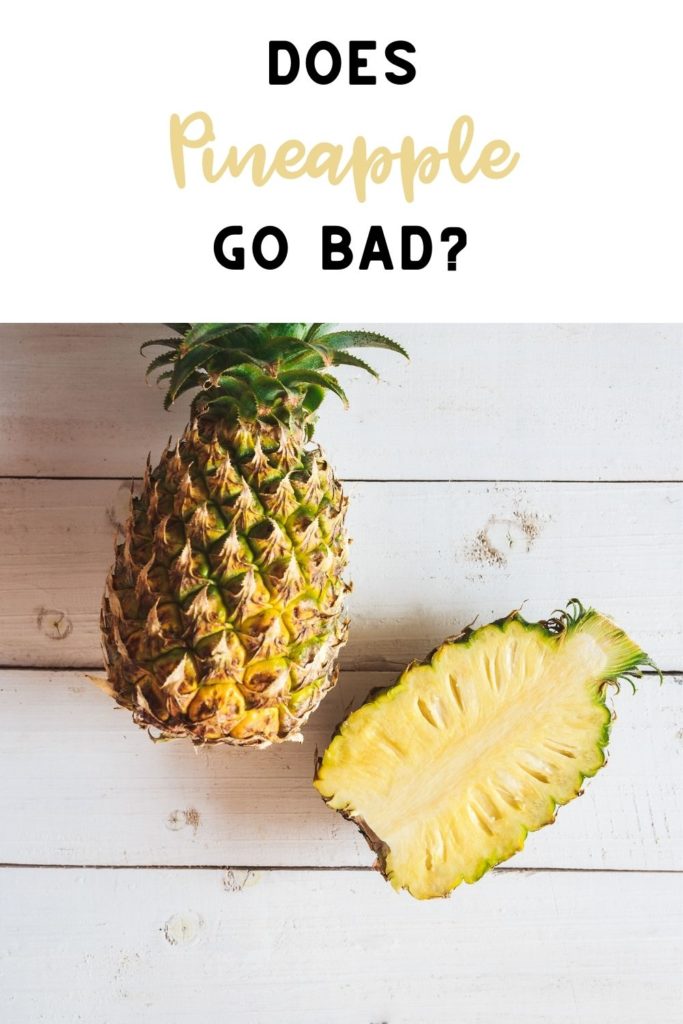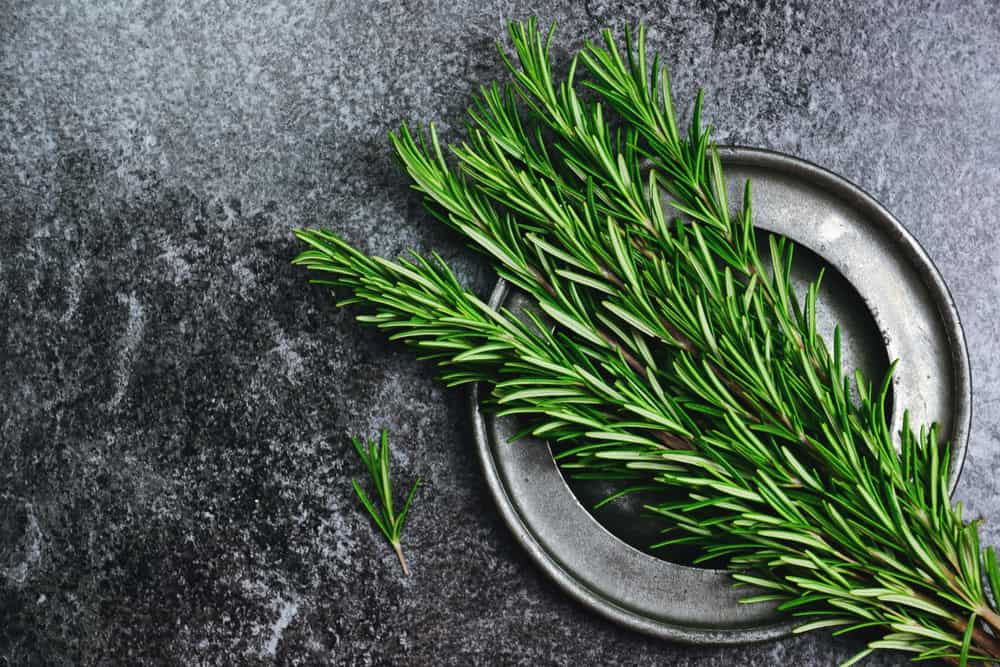Wondering if you can stock pineapples while they are in season? This tropical fruit is rich in disease-fighting antioxidants, digestive enzymes, and immune-boosting constituents.
Pineapples are widely available in the market between March and July. Fortunately, you can enjoy canned pineapples for an extended period.
While it’s possible to consume canned pineapples throughout the year, health experts find the added liquid deleterious due to excess sugars.
However, the indefinite shelf life of tinned products makes canned pineapples an exception. If you love to eat your pineapples fresh, you probably wonder, do pineapples go bad over time?
If yes, how long can you keep it, and what are the signs that your pineapple is no longer edible? Let’s find out:
This post may contain affiliate links. Read my disclosure policy here.
Does Pineapple Go Bad?
Yes, pineapples spoil quickly. However, if proper measures are observed during storage, it will go bad within two days at room temperature. On the other hand, refrigerated pineapples will stay fresh for a couple of days.
A whole pineapple kept at room temperature should stay fresh for a day or two. However, cut pineapple will last in the refrigerator for up to four days; but you can always enhance its shelf life by submerging the pineapple slices in simple syrup.
Canned pineapples include a best-by date on the label. And just like any other canned product, canned pineapple pieces or slices will last for months and even exceed the best-by date.
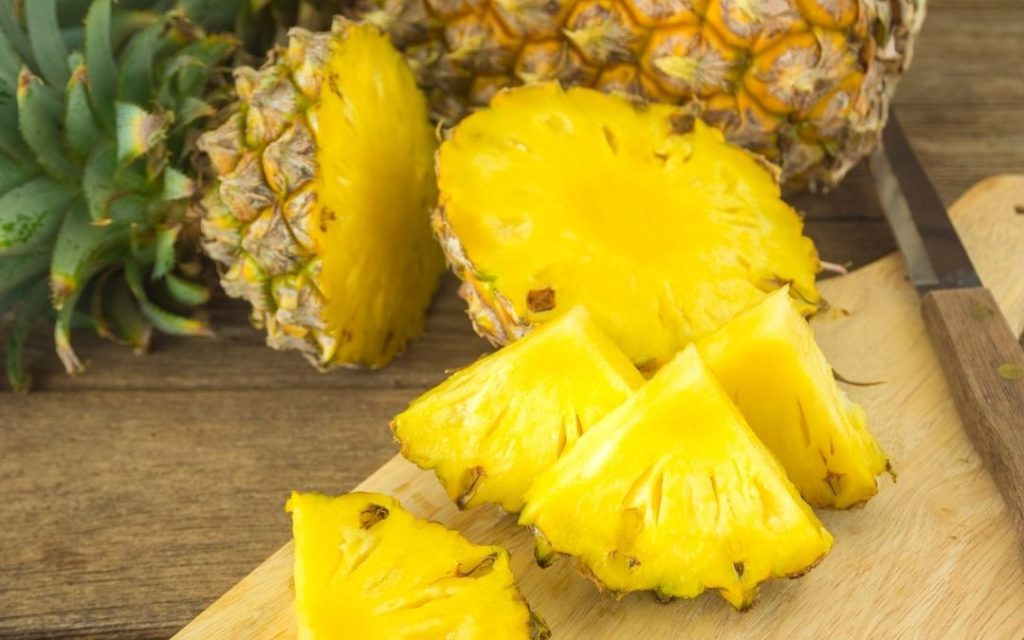
Can You Freeze Pineapple?
Yes, you can freeze pineapple pieces at low temperatures of -18 degrees Celsius. And because it contains 70 percent of liquid juice, you can safely keep it in the freezer.
Freezing a whole pineapple is quite impractical because it consumes a lot of space and takes a lot of time to freeze completely.
You first need to peel your pineapple and cut it into slices or smaller pieces to use this option. Then, wrap the pieces in plastic wrap or aluminum foil. However, the best way to keep them is to use resealable bags or airtight containers.
This will prevent them from taking smalls of other foods kept in the freezer. If possible, freeze individual pieces before placing them in a resealable bag. This way, you can thaw what you need instead of the entire package.
Unsurprisingly, you can also freeze canned pineapples. Just make sure to leave some space, preferably an inch, because the content inside the can will expand upon freezing.
You also don’t want your freezer messy, so avoid using the original can to freeze your canned pineapples. Instead, transfer your canned content in a plastic container and freeze correctly.
How to Store Pineapples—Whole Fruit
1. Pantry
When left at room temperature, this tropical fruit can last up to three days. Remember, this only applies to whole pineapples. Cold and dry conditions affect its shelf life.
Sadly, the acidity level continually increases in such environments. Plus, enhanced storage in the pantry will result in rotting within a few days.
2. Fridge
Unwrapped pineapples or the ones packaged in perforated plastic bags will retain their freshness for up to five days in the refrigerator. Refrain from putting other foods on top of it to prevent immature bruises.
3. Freezer
While you can freeze pineapples, you will want to keep them in slices or chunks. Freezing a whole pineapple is exceptionally unreasonable, and its lifespan is also reduced once thawed.
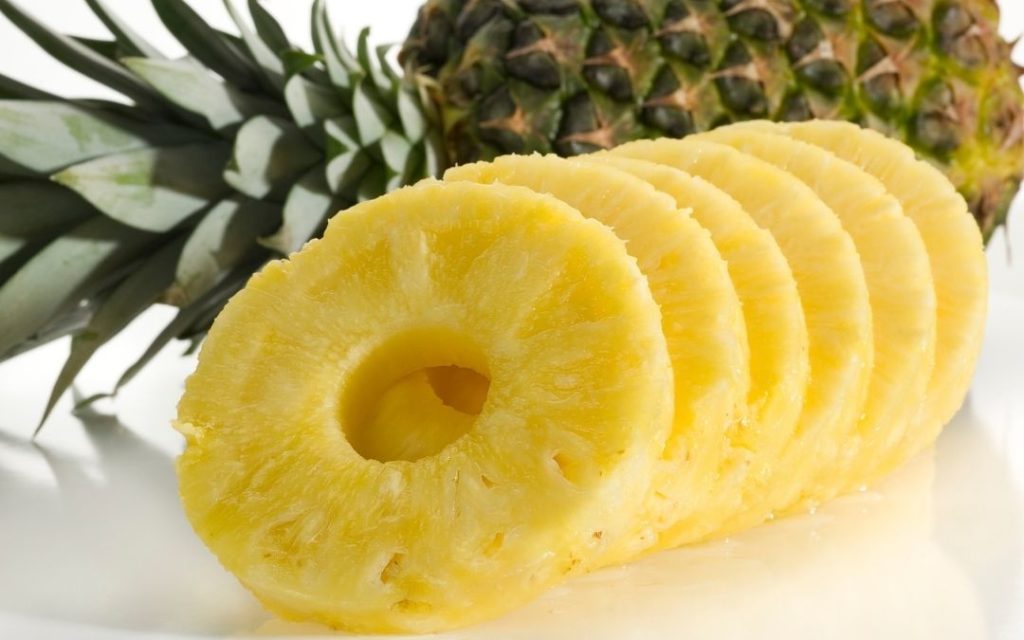
How to Store Pineapples—Slices And Chunks
1. Fridge
Cut your pineapple and put the pieces in an airtight container before refrigerating. Make sure to squeeze out as much as possible if you decide to keep them in resealable bags.
Alternatively, pour simple syrup over the pieces placed in the container to extend their shelf life. You can also sprinkle citrus juice over the pieces to prevent oxidation.
2. Freezer
You can freeze fresh pieces of pineapple in syrup, but it won’t retain the original flavor.
Freezing them in resealable bags or airtight containers is a better way to keep your pineapple chunks fresh for an extended time.
That way, you can consume your frozen pineapples within six months or even more.
How to Store Pineapples—Canned Pineapples
1. Pantry
Pantry is an ideal place to keep canned pineapples since it doesn’t need special conditions.
Canned pineapples are available in juices, slices, chunks, or crushed, so you can choose whichever you prefer. Meanwhile, you should note the product’s lifespan, even though you can eat it past that date.
2. Fridge
Once opened, you should refrigerate the leftovers and use them within four to five days. Again, make sure to transfer the portions to an airtight plastic container before putting them in the fridge.
Ways to Tell If Your Pineapple Has Gone Bad
1. Color
Many myths surround the green color found in fruits, and as such, pineapples with green color are perceived to be unripened.
Ideally, green pineapples won’t taste sweet because harvested fruit can’t ripen perfectly. A ripened pineapple will appear bright and has a yellow color.
The original color of freshly canned pineapples is yellow but becomes pale yellow over time. If your pineapples start showing orange color from the outside and brownish flesh, the chances are that it has started rotting.
2. Smell
Sure, ripe pineapples will smell good, but spoiled pineapples will have a pungent vinegar smell because it has fermented. If this is the case, you need to refrain from eating the pineapple and instead throw it away as it is no longer safe for consumption.
3. Texture
First, you’ll need to ensure that the leaves are green and healthy. If your pineapples are soft outside or look soggy at the bottom, then the chances are that your pineapples have gone bad, and, therefore, you should throw them away.
4. Taste
You know that pineapples are sweet, which means that a different taste should indicate that your pineapples may have gone bad. Please slice a section of your pineapples and taste to see if it has the same sweet taste or a weird taste.
5. Leaves
Another sign that your pineapple is going bad is when the leaves have started drying or lost their color. Therefore, if your pineapples have withered leaves or leaves that have turned yellow, it’s best to throw the pineapple away because it may have gone bad and not safe for consumption.
6. Mold
The occurrence of mold on any type of food indicates that the food has gone bad, and that’s the same case with pineapples. That said, if you see spots on your pineapples, slice a section and confirm if it’s mold. If it’s mold starting to grow, please throw away the pineapple.
7. Can
Your canned pineapple remains safe for consumption as long as the can in which it is canned is not rusty or isn’t leaking. However, when you see any leaking pat on the can or some rust, the chances are that your canned pineapple has gone bad.
What Happens When I Consume Expired Pineapples?
When you consume expired pineapples, you’ll suffer from food poisoning, which can be dangerous. The best precaution is to avoid any pineapples that have shown signs of going bad. Some of these signs may include molds forming on the pineapples.
You will suffer from the effects of food poisoning as fast as 30 minutes after eating the expired pineapples. Symptoms of food poisoning may include nausea, vomiting, and stomach ache. If this happens to you, quickly see your doctor and explain what happened.
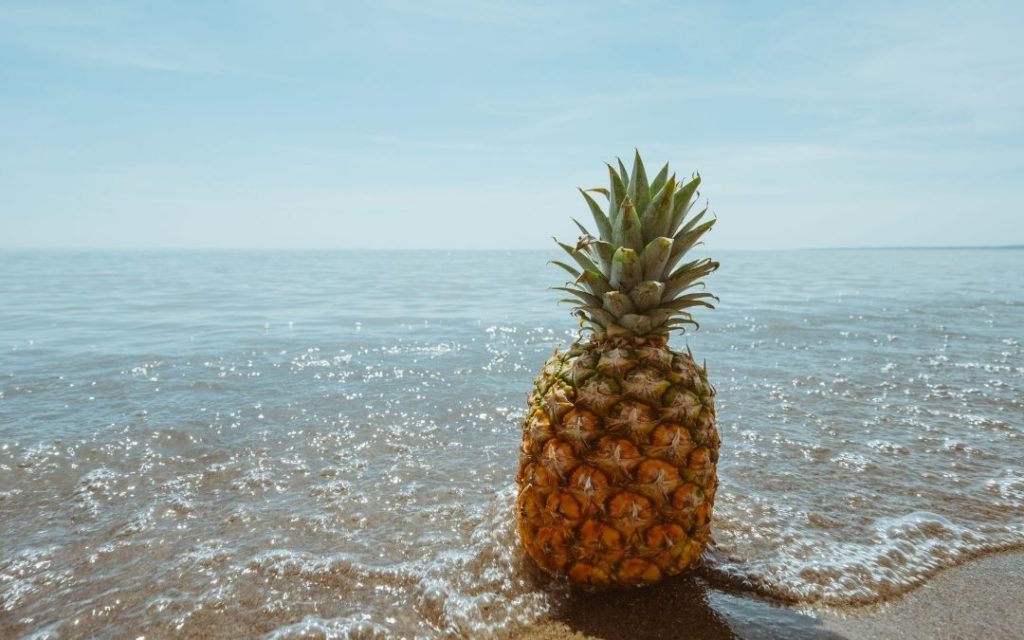
Related Questions
1. Is Eating Old Pineapple Bad For You?
Yes, eating old pineapples is bad for you. When you start to see pineapples showing signs of getting mushy, you need to throw them away to avoid food poisoning incidences. Besides, rotten pineapple is poisonous and may cause you stomach upsets.
2. Can Gone Off Pineapple Make You Ill?
Yes, gone off pineapple can make you ill. That is why it is recommended to check out the most common signs of spoilage and if your pineapple has any of those signs, throw it away. Usually, when pineapple goes bad, there are chances that the skin has contaminated bacteria.
And these bacteria present in the pineapple can cause food poisoning. In fact, staph food poisoning will occur even 30 minutes after you have eaten the rotten pineapple. Symptoms of food poisoning could include stomach ache, nausea, vomiting, etc.
3. When Should You Throw Out Pineapple?
You should throw away pineapple when you see sports on your pineapple’s exterior. These spots, in most cases, are mold, and I’m sure you don’t want to consume anything that has mold on it—at least not fall victim to food poisoning.
4. Can You Eat Fizzy Pineapple?
Yes, you can eat fizzy pineapple because Bromelain can digest proteins. In other words, when you eat fizzy pineapple, the acid present in your stomach will destroy the enzymes. Fizzy-tasting in pineapples means that your pineapple is overripe.
5. What Happens If You Eat Pineapple Every Day?
Eating fresh pineapples is healthy and can help defend your body against harmful radicals and diseases that could put you down. Besides, eating pineapples daily helps with your digestion, increases your energy, and improves your metabolism.
Bottom Line
Yes, pineapples can go bad, but the shelf life depends on what storage method you use to store your pineapples.
If you choose to keep your pineapples in the fridge, rest assured they’ll stay safe for consumption for between four to five days. If you are storing pineapples in the freezer, they’ll last for around three to five months.
Over to you now—please let me know your experience storing pineapples with any of the storage methods discussed above. Sharing your experience with other readers will help them learn.
If you have any questions, please leave a comment, and I’ll do my best to help as soon as possible.
